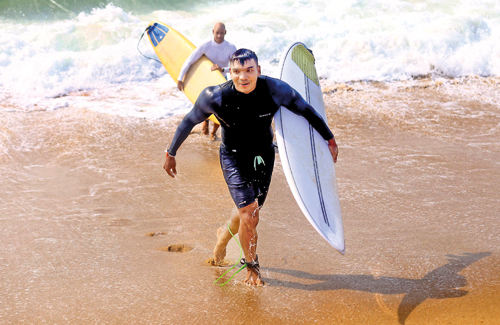Restructuring sports: Mantra or lip service?

The newly appointed Sports Minister, Namal Rajapaksa surfs the waves of his hometown in Hambantota yesterday at the swiftly arranged ‘Beach Games’
Following former Sri Lanka rugby captain Namal Rajapaksa’s appointment as Sports Minister, there is an air of expectation over what changes will take place in the short term.
The 34-year-old Rajapaksa said he would restructure the business of sport to suit the times – a long overdue need, given its uninspired state in the country. He also pledged to get the support of all stakeholders.
“If decisions are made, it will be after consulting all the relevant stakeholders,” he wrote on his official website. “Because, although Sri Lanka has come a long way in sports, a lot more remains to be done.”
His predecessors took some progressive steps, like introducing tough laws to prevent doping and sports-related corruption, amending the Sports Law several times in keeping with international standards. But new ideas are vital to put Sri Lanka on the right track in sports development.
Having played sports at the highest level, the Minister ought to have a deep understanding of the underlying issues that stopped development, and what needs to be done to raise overall standards.
His priority, however, should be to create a ‘sports-for-all’ culture. This is the only way to develop a large enough pool of athletes. It can be done through the long-term athlete development model, a comprehensive scheme that takes a novice to elite levels of performance. It would reward Sri Lanka with a large and capable base of young athletes, some of whom will be high performers.
For this, the Government must invest in infrastructure improvement, not only in Colombo and its suburbs, but in districts where facilities are inaccessible to low-income families. By this, we do not mean squandering billions of rupees on state-of-the-art sports facilities, like the one successive Governments have been promoting to be built in Nuwara Eliya. A high altitude training centre is the least requirement at present. What is required are basic facilities like synthetic tracks, swimming pools, gymnasiums, etc.
It is important to hire a technical director who understands the specific requirements of each sport. He could help design the infrastructure needed to create the athletes’ pool while also helping the Ministry hire the best, technically sound coaches who can relate to athletes and the culture. Not everyone can produce an Olympic medallist but there are those who can inspire and transform lives.
Sports is not just about players. We need coaches, officials and volunteers. Just as good teachers produce good students, the Ministry must invest in good coaches. Sri Lanka has often spent lavishly on foreign coaches to train elite athletes but this has had little impact. A better strategy would be to hire a foreign coach to train the local coaches to lift their overall standards. This way, the benefits would be more numerous and impactful.
Another area of serious concern is the way the Sports Ministry allocates funds. This needs change. It spends considerably to facilitate athletes’ participation in foreign competitions. That should not be the Ministry’s priority.
For instance, Sri Lanka sent a contingent of 173 competitors for the 2018 Asian Games at a massive cost and returned empty-handed.
Participation at such events is important as it gives athletes the exposure and experience required to perform better in future competitions. But there is just no need to send busloads when the outcome is crystal clear even before they board their flight.
Such colossal waste must be stopped. These monies must be channelled towards development and to provide better social and economic conditions for athletes.
The Minister must also identify key sports Sri Lanka can excel at the highest level. There are more than 60 national sports associations registered with the Ministry and they all compete for its funds. Sports that can win medals on the international stage must be identified and supported as a priority. Athletics, boxing, weightlifting, shooting, netball, judo, badminton and few others have potential to produce the next Olympian with a little support.
Every association must receive a target. Funding must be based on performance, on how they achieve set goals. Officials running these sports bodies can thus be held accountable for their actions.
Last but not least, the Ministry should discourage personality-driven leadership in sports associations. That is how they are run now. For instance, cricket has been controlled by three families during the last 25 years. The irreparable damage they have caused is evident in the national team’s performance. It is the same with the National Olympic Committee, which was run by one man for 20 years like his personal property. Leadership only changed two years ago.
This mentality has been a disaster. No matter how difficult it may be, it is time to break away from this style of leadership.
There’s a long road ahead for the young minister but the expectations are high that he will change the sports eco-system for better during his term.


